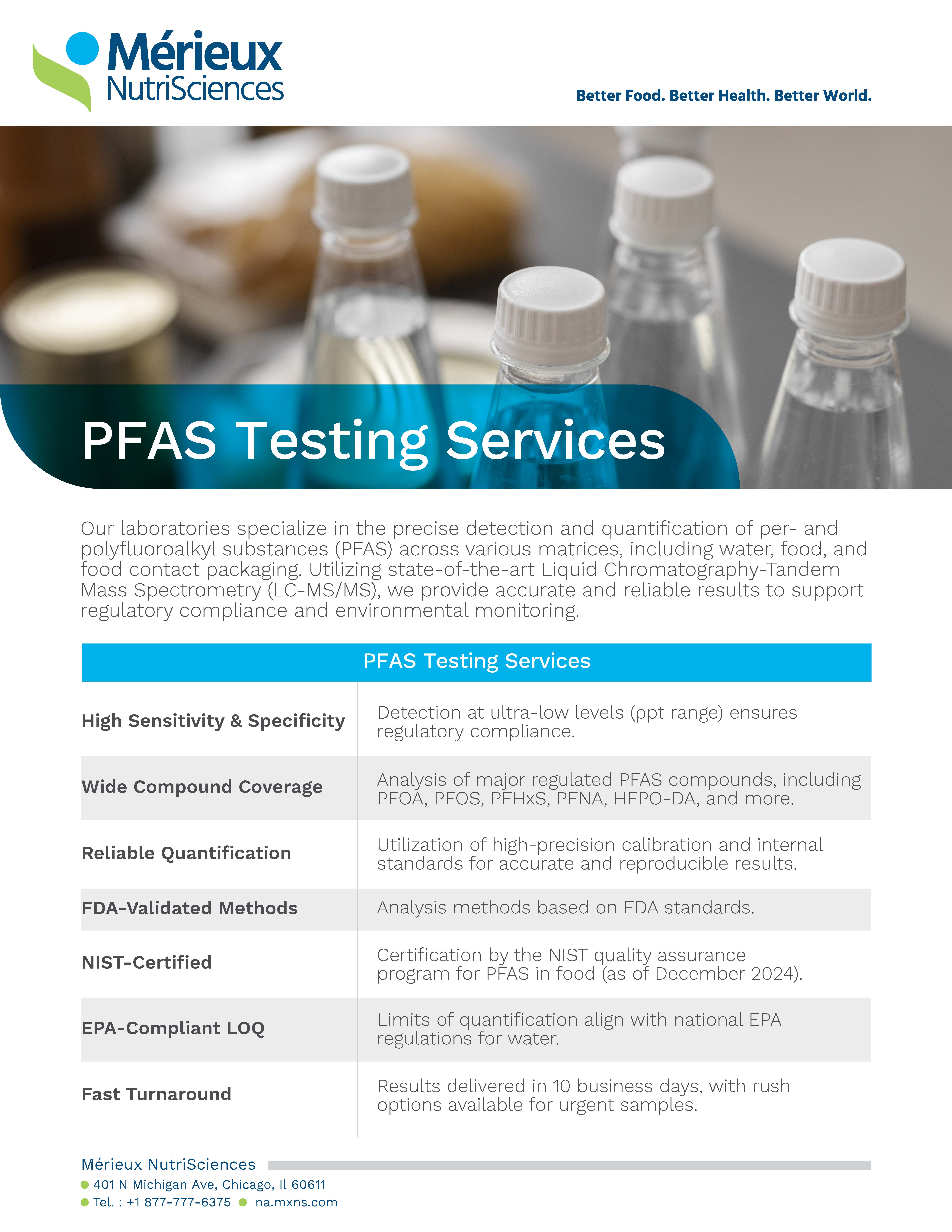PFAS Regulations: Understanding Compliance and Testing Requirements
Learn about PFAS regulations in the EU, Canada, and the U.S., including testing requirements, compliance strategies, and how businesses can manage...
We offer a wide range of services related to PFAS (Per- and Polyfluoroalkyl Substances) testing and consultation, which is essential for businesses whose consumers are concerned about PFAS contamination. We aim to help you tackle this critical issue with our expertise and reliable services, making us a great partner to trust in the fight against PFAS.

PFAS are synthetic chemicals resistant to heat, water, and oil, widely used in consumer and industrial products like non-stick cookware, waterproof clothing, and firefighting foam. However, their overuse and improper disposal have caused soil, water, and air contamination, posing significant environmental and health risks, including:
Our team offers tailored PFAS consultation, from interpreting lab results to designing mitigation strategies that protect your business and consumers.
We provide precise PFAS analysis using advanced LC-MS/MS technology to detect and quantify PFAS compounds in food, water, packaging, soil, and consumer products.
Our experts guide you through evolving PFAS regulations, ensuring your products and processes meet the compliance standards of local, state, federal, and international authorities.
We assess PFAS contamination risks across your supply chain, helping identify potential exposure points and prioritize corrective actions.
We partner with companies to develop innovative PFAS testing methods and solutions, supporting product development and sustainability initiatives.
Learn about PFAS regulations in the EU, Canada, and the U.S., including testing requirements, compliance strategies, and how businesses can manage...
Accurate quantification of PFAS, or Forever Chemicals, is crucial for compliance and public health. Learn about the latest regulations and...
Learn how to manage PFAS in food manufacturing. This webinar covers PFAS risks, FDA regulations, exposure sources, and safer alternatives.
What is PFAS testing? PFAS (Per- and Polyfluoroalkyl Substances) testing is a comprehensive analytical process used to detect and quantify these persistent synthetic chemicals across a variety of matrices, including water, soil, food, and consumer products.
Why is PFAS testing important? PFAS compounds are known for their environmental persistence and potential health risks. Testing is crucial for assessing environmental contamination, ensuring product safety, and ensuring compliance with regulatory standards.
What analytical methods does Mérieux NutriSciences use for PFAS testing? We use advanced technologies such as Liquid Chromatography-Tandem Mass Spectrometry (LC-MS/MS) for sensitive and accurate PFAS detection and quantification.
How long does it take to receive PFAS testing results? Turnaround times vary depending on the sample type and analysis required, but we aim to deliver accurate results within a timeframe that meets our clients’ operational needs.
Can Mérieux NutriSciences provide consulting based on PFAS test results? Absolutely. Our expert team offers result interpretation, compliance support, and guidance on mitigation strategies for managing PFAS contamination.
Is there ongoing support available after PFAS testing? Yes. We offer continuous client support, including follow-up testing, result analysis, regulatory updates, and help in developing mitigation plans.
How can I request PFAS testing or obtain more information? You can request services or additional information by contacting our team through our website, reaching out to customer service, or connecting with your local representative.
What industries benefit from PFAS testing services? Industries such as food and beverage, textiles, packaging, manufacturing, and environmental monitoring benefit greatly from PFAS testing.
What water treatment technologies effectively remove PFAS? A two-stage treatment process involving activated carbon followed by reverse osmosis is effective at removing PFAS. It is important to note that while PFAS are removed from the water, they remain in the treatment media and must be disposed of properly.
Who is responsible for PFAS in water used for manufacturing—water suppliers or manufacturers? While legal responsibility varies, many manufacturers proactively test and treat their ingredient water for regulated contaminants, especially when used in product formulation.
Can PFAS be introduced during food production beyond packaging or release agents? This is extremely unlikely. PFAS contamination during food production, aside from packaging or specific applications like release agents, is not a common concern.
Should companies in the seasoning industry be concerned about PFAS? The risk of PFAS contamination in seasoning products is considered low.
What should retailers with private label products do if unsure about PFAS presence? We recommend testing products using LC-MS/MS.
Does cooking with Teflon pans expose consumers to PFAS? Generally, no. While it depends on how the Teflon was applied and the temperature used during cooking, most consumers are not exposed to harmful PFAS levels through regular pan usage.
Will federal PFAS regulations align with state regulations? Not necessarily. While federal harmonization is often encouraged for trade and consistency, states may adopt more stringent standards, as seen with California’s Proposition 65.
Are PFAS chemicals listed under California’s Proposition 65 regulation? Yes. PFAS compounds such as PFNA, PFOS, and PFOA are listed under Proposition 65 due to their potential health risks.